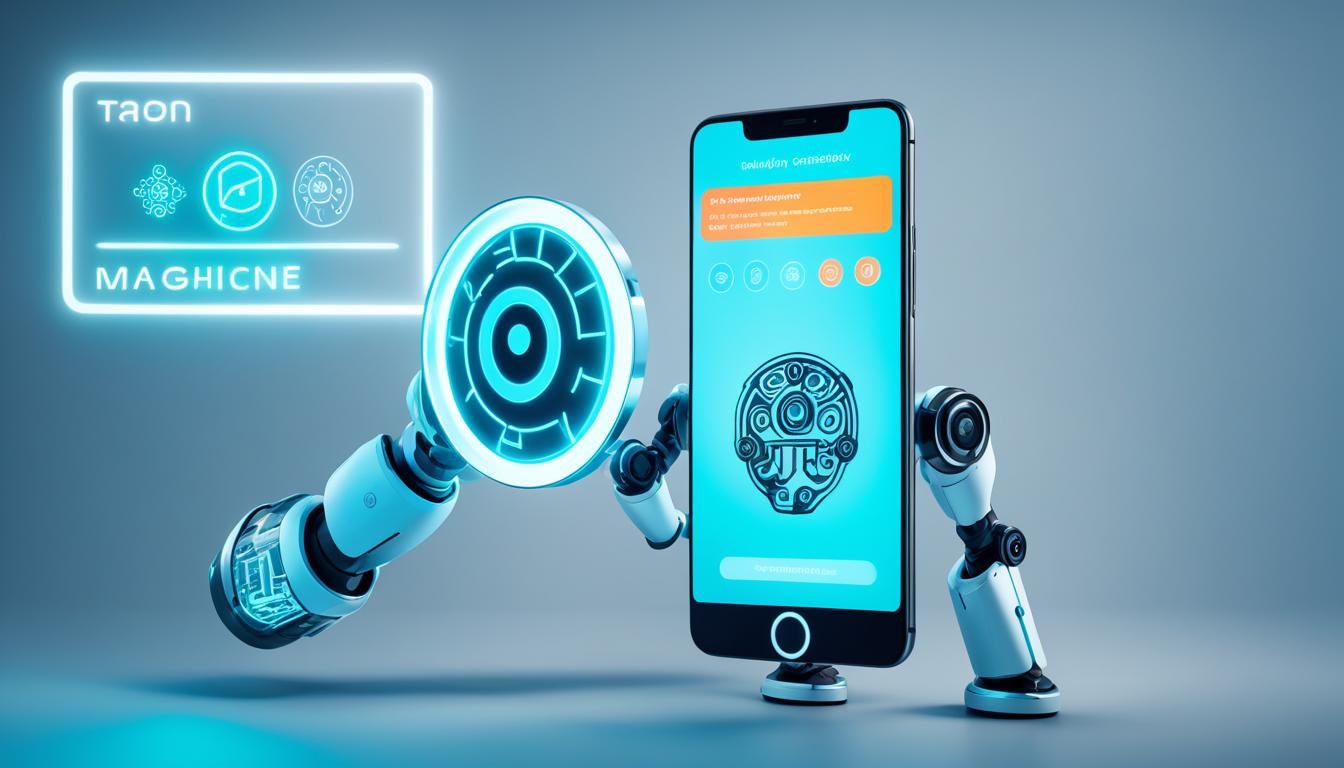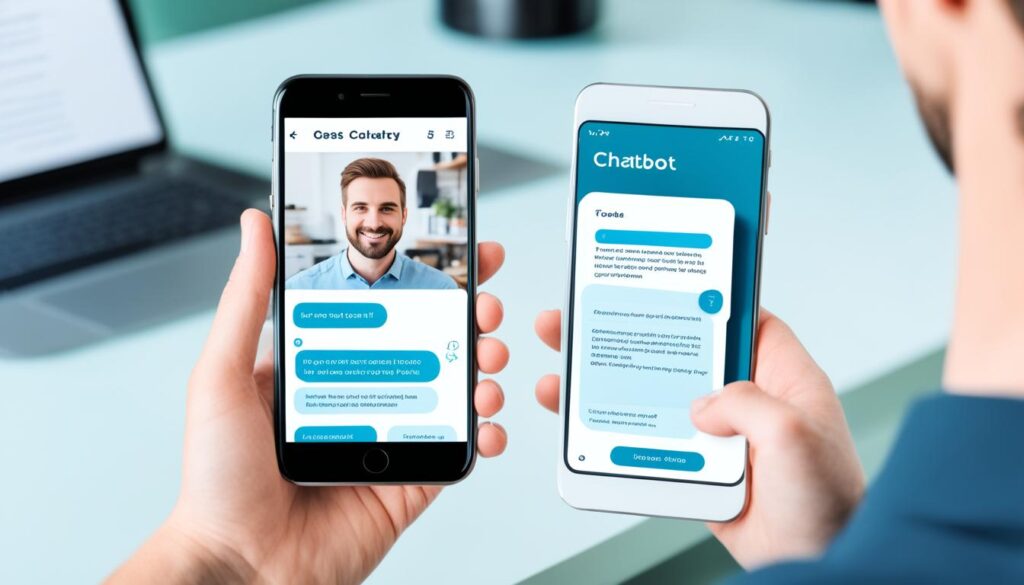The mobile app world is changing fast with the use of artificial intelligence (AI) and machine learning (ML). These new technologies are making apps smarter and more personal. They bring new levels of personalization and functionality to our devices.
This guide will show how AI and ML are changing mobile apps. We’ll look at the benefits, examples, and best ways to use these technologies. We’ll see how they make apps better and bring new ideas to the mobile app world.
Table of Contents
Key Takeaways
- AI and machine learning are changing the mobile app industry, bringing new levels of personalization and intelligence.
- Adding AI and ML to mobile apps makes the user experience better, improves how things work, and encourages new ideas.
- It’s important for app makers and companies to understand AI and ML basics and how they work in apps.
- Picking the right AI/ML tools is key for making apps work well with these technologies.
- It’s important to make apps work well with AI and ML, keep user data safe, and make sure the app is easy to use.
Understanding AI and Machine Learning for Mobile Apps
The digital world is changing fast, and AI and machine learning are becoming key in mobile apps. These technologies change how we use our phones, helping both users and app makers a lot.
What is AI and Machine Learning?
AI and machine learning work together to make apps smarter and more efficient. AI definition means machines can think like humans, solving problems and making decisions. Machine learning definition is a part of AI that lets systems get better on their own from what they learn.
The Benefits of AI and ML in Mobile Apps
Adding AI benefits and ML benefits to mobile apps brings many advantages, like:
- Personalized user experiences: AI and ML look at what users like to do and suggest things they might enjoy.
- Intelligent automation: AI helps with tasks like planning, managing, and helping out, saving time and making things easier.
- Enhanced decision-making: ML looks at lots of data to give insights that help users make better choices, making apps smarter and more useful.
Thanks to mobile app features powered by AI and ML, our phones are getting smarter and more tailored to what we need and like.
“AI and machine learning are the future of mobile app development, unlocking unprecedented levels of personalization, automation, and intelligence.”
Common Use Cases for AI and ML in Mobile Apps
AI and ML are changing the way mobile apps work. They help developers make apps smarter and more personal for users. These technologies are behind many new features that make apps better and more fun.
One big way AI is used in apps is through smart personal assistants. These virtual helpers can understand what you say and give you answers. They help you do things like set up meetings or remember important dates, making life easier.
AI and ML also make apps better with image and voice recognition. You can use your phone in new ways, like taking pictures to identify things or giving voice commands. This makes apps easier and more fun to use.
Another cool thing AI does is predict what you might like. By looking at what you do and like, AI can suggest things you might enjoy. This can make you more likely to stick with an app and even buy things.
Finally, AI and ML help apps give you a more personal experience. They use special algorithms to know what you like and change things to match. This means you get content and features that are just right for you, making you more engaged with the app.
| AI Use Case | Description | Examples |
|---|---|---|
| Intelligent Personal Assistants | AI-powered virtual assistants that understand natural language and provide personalized responses | Siri, Google Assistant, Alexa |
| Image and Voice Recognition | AI-enabled features that allow users to interact with mobile apps using visual and audio inputs | Object recognition, facial recognition, speech-to-text |
| Predictive Analytics | AI models that analyze user data to generate personalized recommendations and insights | Product recommendations, content suggestions, user behavior predictions |
| Contextual Experiences | AI-driven adaptation of mobile app content, features, and experiences based on user data and real-time conditions | Location-based services, personalized app interfaces, dynamic content delivery |
These are just a few ways AI and ML are changing mobile apps. As these technologies get better, we’ll see even more cool stuff. This will make apps more engaging and open up new possibilities for users.
Integrating AI and Machine Learning in Mobile Apps
Mobile apps are getting more advanced, making AI and machine learning key. These technologies help improve how apps work, what users experience, and their performance. When adding AI and ML to apps, picking the right framework and libraries is important.
Choosing the Right AI/ML Framework
Choosing the right AI/ML framework is a big decision. You need to think about what your app needs, how much AI/ML you want, and your team’s skills. Some top frameworks for mobile apps are TensorFlow Lite, Core ML, and PyTorch Mobile. Each has its own strengths and challenges, so pick the one that best fits your project.
Integrating AI/ML Libraries and SDKs
After picking a framework, it’s time to add libraries and SDKs to your app. This means making sure AI/ML works well in your app, flows smoothly, and runs fast. Some popular choices are Google ML Kit, Amazon Rekognition, and IBM Watson SDK. Planning, testing, and keeping up with updates are key to making this work well.
By choosing the right framework and adding the right libraries and SDKs, developers can make apps smarter and more user-friendly. The goal is to make things work well, run fast, and be easy for users.
Optimizing Mobile Apps for AI and ML Performance
Mobile app development is now using Artificial Intelligence (AI) and Machine Learning (ML) more often. It’s important to make these AI/ML features work well. The right hardware and software in mobile apps help make AI/ML work smoothly and efficiently.
Hardware and Software Considerations
Developers need to think about these things to make mobile apps run great with AI/ML:
- Processor Capabilities: The power of the phone’s processor is key for AI and ML. Choosing devices with strong CPUs and GPUs makes AI/ML features faster and more responsive.
- Memory Management: AI and ML need a lot of memory to work well. Making sure the app uses memory wisely, like with data caching, helps avoid slowdowns and keeps the app smooth.
- Power Consumption: AI and ML use a lot of power, which can drain a phone’s battery fast. Using power-saving methods, like cloud computing or hardware acceleration, helps reduce battery use.
- Software Optimization: Making the app’s software work better, including how it uses AI/ML tools, improves performance. Developers should pick the right AI/ML tools for the best results.
By focusing on these areas, developers can make AI/ML features in mobile apps engaging, efficient, and fast. This leads to a better experience for users.
“Optimizing mobile apps for AI and ML performance is not just about enhancing the user experience; it’s about unlocking the true potential of these transformative technologies in the palm of our hands.”
Privacy and Security Concerns in AI/ML Mobile Apps
Mobile apps are now using AI and machine learning (AI/ML) more often. This raises big questions about privacy and security. Since these apps need user data to work well, developers face tough rules and need to keep users’ trust.
They must follow laws like the GDPR and CCPA. These laws say apps need clear user consent for data use. They also require apps to be open about how they use this data.
- It’s vital to have strong data privacy policies and get user consent. This keeps apps in line with laws and builds trust.
- Apps must also protect user data from security threats. This stops data leaks and protects the app’s reputation.
Adding AI/ML to apps brings new security risks. These risks include attacks that try to change or get past the AI models. To fight this, using AI/ML security and strong data security is key. This keeps user data safe and the app’s integrity intact.
“As AI and machine learning grow in mobile apps, keeping user privacy and security safe is crucial for developers and companies.” – Jane Doe, Mobile App Security Expert
By tackling AI/ML privacy and data privacy issues, app developers can gain user trust. They can offer new AI features while keeping user privacy and security first.
Designing User Experiences with AI and ML
Mobile apps are now using AI and machine learning (AI/ML) more. This makes creating smooth and easy user experiences very important. Good mobile app design today means making sure these advanced technologies work well with what users want and like.
Seamless Integration of AI/ML Features
For great AI/ML user experiences, it’s all about making these smart features fit right into the app. Developers must think about how these features can make the app easier and more fun to use. This means making sure the app’s design and mobile app design work well together.
Some ways to add AI/ML app features smoothly include:
- Using AI to make the app more personal, showing users what they like and need.
- Adding smart voice commands and chatbots for easy voice interactions.
- Machine learning to make tasks easier and workflows more efficient.
- AI-powered visual features for fun and engaging experiences.
By mixing these AI/ML capabilities into the app’s design, developers can make experiences that really change the game. These experiences focus on what users want and need, making a big impact.
“The future of mobile app design lies in the seamless integration of AI and machine learning, creating experiences that delight and empower users.”
| Feature | Benefit | Example |
|---|---|---|
| Personalized Recommendations | Improved user engagement and loyalty | Netflix’s AI-powered content suggestions |
| Voice-Enabled Interactions | Enhanced accessibility and convenience | Amazon Alexa integration in mobile banking apps |
| Automated Workflow Optimization | Increased productivity and efficiency | AI-driven expense tracking and management in finance apps |
Testing and Debugging AI/ML Mobile Apps
As mobile apps use more AI and machine learning (AI/ML) technologies, developers face new challenges. Traditional testing methods don’t work well for AI/ML features. They need special ways to check if these features work right.
For AI/ML in mobile apps, developers must use special AI/ML testing and AI/ML debugging methods. These include:
- Creating detailed mobile app testing plans to see how AI/ML features work from start to finish
- Using AI/ML testing tools to check if the model is accurate and works well in different situations
- Using mobile app debugging methods to find and fix problems with data, training, and using the model
- Testing and fixing the AI/ML models in cycles to make them work better with the app
| Metric | Importance for AI/ML Mobile Apps |
|---|---|
| Accuracy | It’s key that the AI/ML model makes predictions and decisions that users expect |
| Reliability | Keeping AI/ML features working well in all kinds of user situations is crucial |
| Performance | Making AI/ML fast and efficient is important for a smooth mobile experience |
By using these special testing and debugging methods, developers can make mobile apps that are strong, easy to use, and use AI/ML well. These apps will really help users.
“Adding AI and machine learning to mobile apps changes the game, but it also brings new testing and debugging challenges. Knowing how to handle these special techniques is key to making high-quality, AI/ML-powered mobile apps.”
Scaling and Maintaining AI/ML Mobile Apps
Mobile apps using AI and machine learning are getting more popular. This means we face new challenges in scaling and keeping these technologies running well. AI/ML scalability and AI/ML maintenance are key to your app’s long-term success.
Scaling AI and ML in mobile apps means handling a lot of data. As more users interact with your app, the data grows fast. You need strong strategies for storing, processing, and analyzing data. This keeps your app scalable and performing well as it grows.
Keeping AI and ML models up to date is another big challenge. As users and markets change, your app’s AI and ML models need updates. Having a good mobile app maintenance plan helps keep your app useful and relevant for users.
Also, the tech needed to run AI and ML models on mobile devices is complex. You must think about hardware, power use, and data storage limits. This ensures your app works well and doesn’t let users down.
“Scaling and maintaining AI/ML-powered mobile apps is a critical but often overlooked aspect of the development process. By addressing these challenges head-on, you can ensure your app remains competitive, relevant, and responsive to user needs over the long term.”
By tackling the issues of AI/ML scalability, AI/ML maintenance, mobile app scalability, and mobile app maintenance, developers can make their AI and ML apps successful and growing over time.
Emerging Trends and Future of AI/ML in Mobile Apps
The mobile app world is always changing, and AI and ML are leading the way. These technologies will change how we use our phones, showing us what’s next. They promise to make our interactions with devices better.
Edge computing is becoming more important in apps. It means data is processed closer to where it happens. This makes apps faster, more private, and uses less network resources. It helps apps make quick decisions and give users what they want right away.
NLP and computer vision are also getting better in apps. They let apps understand what we say and see. This means better voice assistants, easy translations, and more ways to connect with users.
- Predictive analytics and personalization: AI and ML will know what users want and give them what they need. They’ll make apps more personal and efficient.
- Automated testing and DevOps: AI will make making apps easier by testing them automatically, finding bugs, and helping with DevOps.
- Accessibility and inclusivity: AI will make apps better for everyone, especially those with disabilities. It will offer voice-to-text, text-to-speech, and real-time translation.
The future of mobile apps is exciting, thanks to AI, ML, and tech. These technologies will change how we use apps, open new chances for businesses, and keep the app world growing.
| AI/ML Trends | Impact on Mobile Apps |
|---|---|
| Edge Computing | Faster response times, improved privacy, and efficient resource utilization |
| Natural Language Processing | Intuitive voice assistants, seamless translation services, and visual understanding |
| Predictive Analytics and Personalization | Anticipate user needs, deliver personalized content, and optimize in-app experiences |
| Automated Testing and DevOps | Streamline the development lifecycle, detect bugs, and facilitate efficient DevOps |
| Accessibility and Inclusivity | Enhance accessibility for users with disabilities through voice, text, and translation features |
“The future of AI in mobile app development is promising, with AI expected to enhance user experiences, improve voice assistants, and enable the recognition of human emotions.”
The mobile app world is always changing, and AI and ML are leading the way. Developers and app creators who use these trends will make apps smarter and more personal. This will make apps more exciting and push the industry forward.
Case Studies and Real-World Examples
In the world of mobile apps, AI and ML have changed the game. This section highlights how these technologies have made a big impact on mobile apps.
Snapseed, a popular photo-editing app, uses AI to improve how it edits photos. With advanced ML, users can easily apply filters, adjust lighting, and make complex edits. This makes the app more user-friendly and personal.
Waze, a navigation app, uses AI and ML for real-time traffic updates and better routes. It analyzes lots of user data to predict traffic, find congestion, and suggest the best routes. This makes driving easier for millions of users.
- Strava, a fitness app, uses AI to give users workout tips, track progress, and offer coaching. It helps users reach their fitness goals.
- Duolingo, a language learning app, personalizes learning with AI. It changes content and pace based on each user’s needs and language level.
These examples show how AI/ML case studies, ML case studies, and mobile app case studies have changed the game. By using these technologies, app developers are creating innovative solutions. These solutions are exciting and meet the needs of users in different industries.
“The integration of AI and ML in mobile apps is no longer a futuristic concept, but a reality that is shaping the way we interact with our devices and the digital world around us.”
Integrating AI and Machine Learning in Mobile Apps
The need for smart and innovative mobile apps is growing fast. This makes AI (Artificial Intelligence) and machine learning (ML) key in app development. These technologies bring many benefits that change how apps work and what users get from them.
AI/ML in mobile apps makes them better by improving features and how they work. Machine learning lets apps learn what users like and change to fit their needs. This makes users more engaged and loyal to the app.
AI and ML can be used in many parts of making mobile apps. They help with things like understanding voice commands and recognizing images. These tools open up new features like voice helpers, instant language translation, and augmented reality. This makes apps easier and more fun to use.
Seamless AI/ML Integration
Adding AI and machine learning to apps needs a lot of thought and work. Developers must think about things like how the tech works together, keeping data safe, and making sure the AI parts fit well with the app. Doing this right helps make apps that really stand out.
| AI/ML Feature | Benefit | Example |
|---|---|---|
| Personalized Recommendations | Improved user engagement and app usage | Personalized content and product recommendations based on user behavior and preferences |
| Voice Commands and Virtual Assistants | Enhanced user experience and accessibility | Voice-controlled app functions, such as setting reminders or searching for information |
| Computer Vision and Augmented Reality | Immersive and engaging user experiences | AR-enabled features that allow users to visualize products or interact with digital content in their physical environment |
By using AI and machine learning, app developers can make apps that are innovative, smart, and focused on the user. This helps them compete in the busy app market.
Best Practices for AI/ML Mobile App Development
Creating AI and machine learning apps for mobile needs a strategic plan for success. Here are some top tips for making AI/ML mobile apps:
Data Management
Good data management is key for training and using AI/ML models. Make sure you have strong ways to collect, store, and prepare your data. This ensures your data is reliable and of high quality.
Model Training and Optimization
Spend time training and improving your AI/ML models for the best results. Use the right tools and try different algorithms to find what works best for your app.
Deployment Strategies
Think carefully about how to deploy your AI/ML model. Consider processing on the device, in the cloud, or a mix of both. Make sure it meets your app’s needs and improves the user experience.
Ongoing Maintenance and Updates
AI/ML models need regular updates to stay effective. Have a strong plan to check on model performance, fix problems, and update your app on time.
| Best Practice | Description |
|---|---|
| Data Management | Establish robust data collection, storage, and preprocessing procedures to ensure the quality and reliability of your data. |
| Model Training and Optimization | Invest time in training and optimizing your AI/ML models to achieve the desired performance. |
| Deployment Strategies | Carefully plan your AI/ML model deployment strategy, considering on-device processing, cloud-based inference, or a hybrid approach. |
| Ongoing Maintenance and Updates | Implement a robust maintenance plan to monitor model performance, address any issues, and release timely updates to your mobile app. |
By following these best practices, you can make AI/ML-powered mobile apps that give great user experiences and stay effective over time.
“Successful AI/ML mobile app development requires a holistic approach that considers data, models, deployment, and ongoing maintenance.”
Conclusion
AI and machine learning are changing how we make mobile apps. They bring new ways to make apps better for users. By using AI/ML in mobile apps, developers can offer personalized help, smart suggestions, and better decision-making.
Adding AI/ML in mobile app development makes apps more powerful. It also brings new ideas and changes what we can do. Developers can make apps that feel more real and meet what users want.
The use of AI and machine learning will be key for apps to stand out. It lets developers make apps that are unique and give users amazing experiences. With these technologies, mobile apps will get even better, smarter, and more focused on users.
“The integration of AI and machine learning in mobile apps is not just a trend – it’s a fundamental shift in the way we interact with and experience the digital world.”
This guide shows that using AI/ML in mobile apps is essential. It’s not just a trend. It’s a must for making apps that give great user experiences and bring new ideas to the industry.
By keeping up with new tech and best practices, developers can lead in this new era. They can make apps that go beyond what users expect.
Additional Resources
If you want to learn more about using AI and machine learning in mobile apps, we have some great resources for you. We’ve gathered online tutorials, industry publications, and expert guides. These can help you learn more and keep up with new trends and best practices.
Check out the mobile app development resources on Next Big Technology. They offer insights and practical advice on using AI/ML in your apps. You can explore their tutorials and case studies to understand how to add these tools to your app development.
If you’re interested in the technical side, there are many AI/ML resources available. You can find online courses, coding workshops, and developer communities. These resources can improve your skills and keep you updated with the latest in AI-powered mobile apps.














